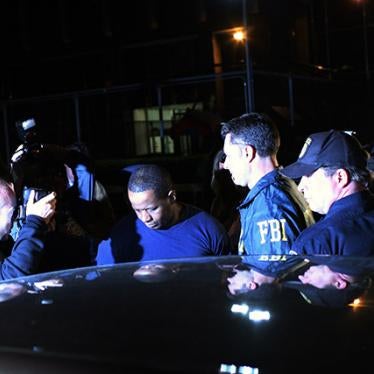The plan to fly drones laden with explosives into the U.S. Capitol and the Pentagon had all the trappings of a post-Sept. 11 spy thriller: high-tech weaponry, secret reconnaissance trips and a dramatic government sting operation that nabbed the Islamic terrorist just in time. “Thanks to the diligence of the FBI and our many law enforcement partners,” the Justice Department declared in September 2011, announcing the arrest of a suspect, “that plan was thwarted.”
And here’s another way in which the plot resembled a piece of airport fiction: It was largely invented.
To start with, the alleged plotter, Rezwan Ferdaus, a 26-year-old from Ashland, Massachusetts, was an unlikely terrorist. “Obviously [Rezwan] has mental issues,” his father remembers an FBI agent telling him in 2010, after the son came to the attention of the agency through a case of mistaken identity. The family had become increasingly concerned as their son, once a diligent and well-liked student, withdrew into depression.
This didn’t stop the FBI from pursuing him doggedly, sending an undercover informant — a man with a history of drug- and gang-related offenses — to Ferdaus’ mosque in Worcester and later enlisting two FBI undercover employees to pose as Al Qaeda operatives. For months, the informant and agents met with Ferdaus, developing a plan to attack the Pentagon and Capitol, during which time Ferdaus shed so much weight that his cheekbones protruded, he lost control of his bladder and experienced depression and seizures so severe that his father quit work to look after him.
The agents provided the money and materials for the plot, and there’s no evidence that Ferdaus could have engaged in any criminal activity had they not urged him on. In fact, his attorney said, Ferdaus repeatedly tried to back out. But, with the encouragement of the undercover agents, Ferdaus continued to plan an attack, building explosive devices and traveling to Washington, D.C., allegedly to conduct surveillance. Likely fearing a hostile jury and a harsh sentence if he went to trial, Ferdaus pleaded guilty and, in 2012, was sentenced to 17 years in prison.
Since the Sept. 11, 2001, attacks, the U.S. government has prosecuted more than 500 people in the United States for terrorism-related offenses, an impressive tally that suggests law enforcement is keeping Americans safe. Certainly, the FBI and Justice Department have worked hard to foster this perception, with news conferences and public statements trumpeting the latest plot defused and terrorism suspect apprehended.
But examine many of these cases closely, as Human Rights Watch and Columbia Law School’s Human Rights Institute did, and you begin to see that there’s often less to the alleged terrorist plots than meets the eye. In more than a decade since the Sept. 11, 2001, attacks, the FBI, targeting American-Muslim communities, has frequently helped to create ersatz terrorist plots, supplying the plan, the means and even the motivation — and then encouraging the target to follow through. In several cases we documented, those targeted for these “investigations” suffered from mental illness or were desperately poor, or sometimes both.
Human rights violations often occur at every stage of a terrorism prosecution, from investigation through trial and sentencing. By amending the material support for terrorism laws to criminalize even protected speech, Congress has allowed prosecutors to charge people with terrorism offenses even if they never intended to support terrorism. At trial, terrorism defendants face an uphill battle as judges allow secret evidence or evidence that has been coerced. Many spend months or years in pretrial detention under harsh conditions, often in solitary confinement. Once convicted, they frequently are handed unduly long sentences, frequently in isolation, with limited access to lawyers and family members.
Far from protecting Americans from the threat of “homegrown” terrorism, these federal policies and practices have diverted law-enforcement resources from pursuing real threats and alienated many American Muslims, shutting down the lines of communication between communities and U.S. authorities. And the FBI has diverted significant resources from other investigations, leading to fewer arrests for both violent and nonviolent crimes.
Instead of treating all American Muslims as terrorists-in-waiting, the FBI should develop partnerships with communities that respect and enhance human rights. It should send informants into mosques only as part of an actual investigation into criminal activity and under strict oversight. This will improve the odds of catching genuine criminals and ensure that government resources are used both lawfully and effectively.
Some people do commit terrorism offenses, and the FBI and the Justice Department have a responsibility to both prevent and prosecute them. But protecting rights while strengthening community relationships will help defuse real threats, making all Americans safer.
Andrea J. Prasow is deputy Washington director of Human Rights Watch.







